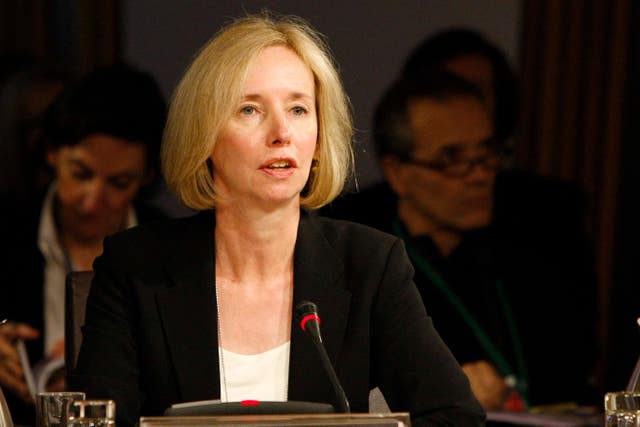
The Health Secretary has said Scotland’s NHS will not face a £1.8 billion black hole, despite projections in a recent report.
Speaking to Good Morning Scotland on Thursday, Jeane Freeman welcomed the “fair” report from Audit Scotland but predicted that her department would lower the projected deficit.
The Auditor General released the report on Thursday, forecasting a £1.8 billion shortfall by 2023-24 and describing the NHS in Scotland as “financially unsustainable”.
READ MORE: Boris Johnson to tell Donald Trump the NHS is not on the table in post-Brexit trade deal
Asked if the Scottish Government will be able to mitigate the shortfall in the next four years, Ms Freeman said: “I believe I can say that, on the basis of past history.
“For example, what the Auditor General is talking about is the level of financial challenge – that is never matched by what you end up with at the end of a financial year in terms of the deficit.
“In the past year, the financial challenge was around £135 or £140 million, the final deficit at the end of that year was £65 million.
“I’m not saying that to deflect from the fact that there is a financial challenge, but I think we will get to a point where we reduce that.
“But the real point is you can’t keep on doing that unless you reform – you have to do both.”
Ms Freeman said the service must be made more efficient to stem the financial challenges.
She said the pace of reform was not quick enough, agreeing with comments from BMA Scotland boss Dr Lewis Morrison, who said the health service was “a big ship to turn around”.
She also agreed with the Auditor General’s comments that “we can’t just buy our way out of this”.
Ms Freeman said: “One of the things I wanted to achieve is an increase in the pace of integration of health and social care, that’s the key reform.
“We have to do that with our partners in local authorities. Integrating health and social care is a joint venture between the Scottish Government, Cosla, between health boards and local authorities.”
Audit Scotland said the ambitions set out in the Scottish Government’s 2020 vision for the health service – of providing more care closer to home with a reduction in demand for hospital services – “will not be achieved by 2020”.
Auditor General for Scotland Caroline Gardner said: “The NHS in Scotland is running too hot, with intense pressure on staff and a service model that will remain financially unsustainable without a much greater focus on health and social care integration.”
Without reform, the report said ministers have already forecast that spending on health and social care could rise to £20.6 billion by 2023-24 – up from £13.4 billion in the 2018-19 budget.
The NHS budget deficit is also predicted to be “significantly larger” than the total of £116 million in 2019-20 – with this expected to reach £207 million in 2021-21.
Most of this is down to NHS Lothian, which forecasts a deficit of almost £90 million, the report said, while NHS Greater Glasgow and Clyde is anticipating a deficit of £61.5 million.
The warning comes as the NHS in Scotland faces a “significant” maintenance backlog and challenges resulting from Brexit, while only two out of eight key national waiting times standards are being met.
 Caroline Gardner, Auditor General for Scotland (Andrew Cowan/Scottish Parliament/PA)
Caroline Gardner, Auditor General for Scotland (Andrew Cowan/Scottish Parliament/PA)
Dr Morrison said: “It is clear our NHS is seriously struggling to become financially sustainable,” he said.
“The suggestion of a £1.8 billion funding gap for 2023-24 – something we have been warning of for some time – just serves to illustrate the growing gap between demand for care and resources available to our NHS.”
Tory health spokesman Miles Briggs said Scottish Government failings had been “brutally exposed” in “another utterly damning report by independent Audit Scotland”.


Why are you making commenting on The Herald only available to subscribers?
It should have been a safe space for informed debate, somewhere for readers to discuss issues around the biggest stories of the day, but all too often the below the line comments on most websites have become bogged down by off-topic discussions and abuse.
heraldscotland.com is tackling this problem by allowing only subscribers to comment.
We are doing this to improve the experience for our loyal readers and we believe it will reduce the ability of trolls and troublemakers, who occasionally find their way onto our site, to abuse our journalists and readers. We also hope it will help the comments section fulfil its promise as a part of Scotland's conversation with itself.
We are lucky at The Herald. We are read by an informed, educated readership who can add their knowledge and insights to our stories.
That is invaluable.
We are making the subscriber-only change to support our valued readers, who tell us they don't want the site cluttered up with irrelevant comments, untruths and abuse.
In the past, the journalist’s job was to collect and distribute information to the audience. Technology means that readers can shape a discussion. We look forward to hearing from you on heraldscotland.com
Comments & Moderation
Readers’ comments: You are personally liable for the content of any comments you upload to this website, so please act responsibly. We do not pre-moderate or monitor readers’ comments appearing on our websites, but we do post-moderate in response to complaints we receive or otherwise when a potential problem comes to our attention. You can make a complaint by using the ‘report this post’ link . We may then apply our discretion under the user terms to amend or delete comments.
Post moderation is undertaken full-time 9am-6pm on weekdays, and on a part-time basis outwith those hours.
Read the rules hereLast Updated:
Report this comment Cancel